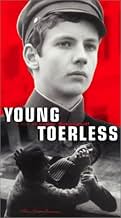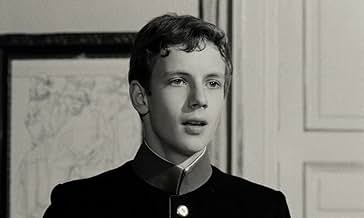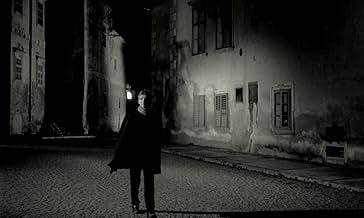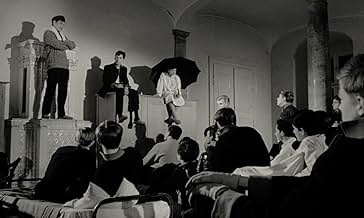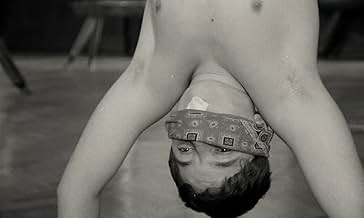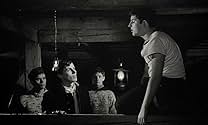IMDb RATING
7.2/10
2.8K
YOUR RATING
In a boarding school, a student observes in passive disgust as his two friends manipulate, humiliate and torture a fellow student, justifying their every act.In a boarding school, a student observes in passive disgust as his two friends manipulate, humiliate and torture a fellow student, justifying their every act.In a boarding school, a student observes in passive disgust as his two friends manipulate, humiliate and torture a fellow student, justifying their every act.
- Director
- Writers
- Stars
- Awards
- 4 wins & 1 nomination total
- Director
- Writers
- All cast & crew
- Production, box office & more at IMDbPro
Featured reviews
Young Törless is a pertinent reflection on good and evil and the way an individual behaves, given the lack of values in others.
In comparison with the moral and ethical values required by institutions, human behavior seems to follow an errant, amoral path, simply determined by chance, or the current of events. Especially when manifested in a group, human beings lose any values and act according to the tide. They practice excesses and suffer humiliations instinctively, as if they were a fatality of life.
The few who show the courage to remain faithful to fundamental values are marginalized, seen as outsiders, labeled as dreamers.
Being a German film from 1966, it is impossible not to relate this criticism to the rise and fall of Nazism, just 21 years earlier.
A film in which Volker Schlöndorff puts a finger on the wound of Nazism, still open in German society, and forces his compatriots to reflect on the mistakes of the past.
In comparison with the moral and ethical values required by institutions, human behavior seems to follow an errant, amoral path, simply determined by chance, or the current of events. Especially when manifested in a group, human beings lose any values and act according to the tide. They practice excesses and suffer humiliations instinctively, as if they were a fatality of life.
The few who show the courage to remain faithful to fundamental values are marginalized, seen as outsiders, labeled as dreamers.
Being a German film from 1966, it is impossible not to relate this criticism to the rise and fall of Nazism, just 21 years earlier.
A film in which Volker Schlöndorff puts a finger on the wound of Nazism, still open in German society, and forces his compatriots to reflect on the mistakes of the past.
Considered a classic film as it was the first film to put the then New German Film firmly on the (international) map. Also a classic because it was Schlöndorf's first feature and it is still thought highly of. To be sure, this is a beautiful film to watch with its superb black-and-white cinematography; Schlondörf's direction makes it into a well paced and staged, stylish film. But I never liked the film; recent re-viewing confirmed my feelings.
Schlöndorf wants to do more than simply bring the viewer the subject and with that the whole thing goes wrong. In trying to convey the deeper meaning of the story as clear as possible the script is written in such way that even the most simple minded can not miss it. The film is lecturing without any subtleties; Schlöndorf never provokes the viewer to think for himself: he has already done it for him. Nor is there any nuance in the psychology of the different characters.
And what about the cast? In 1966 (and still) praised for their effort as inexperienced actors. Well, I think that most of the acting is downright poor, or never goes further than reciting lines. In the meantime we have come to know Mathieu Carriere better during his career; Carriere is in this his first film as boring as he still is. Of course the actors were not helped much by the literary dialogue, another feature that was (and is) praised so much; most of it I find simply laughable. Classic miscast is Barbara Steele, who seems to have walked in from the set of a typical sexploitation film, including acting style.
Schlöndorf wants to do more than simply bring the viewer the subject and with that the whole thing goes wrong. In trying to convey the deeper meaning of the story as clear as possible the script is written in such way that even the most simple minded can not miss it. The film is lecturing without any subtleties; Schlöndorf never provokes the viewer to think for himself: he has already done it for him. Nor is there any nuance in the psychology of the different characters.
And what about the cast? In 1966 (and still) praised for their effort as inexperienced actors. Well, I think that most of the acting is downright poor, or never goes further than reciting lines. In the meantime we have come to know Mathieu Carriere better during his career; Carriere is in this his first film as boring as he still is. Of course the actors were not helped much by the literary dialogue, another feature that was (and is) praised so much; most of it I find simply laughable. Classic miscast is Barbara Steele, who seems to have walked in from the set of a typical sexploitation film, including acting style.
The movie won an award at the Cannes Film Festival when it was first released and signaled the beginning of a German cinematic revival. The book was written in 1906 and is a tedious read, although thankfully a short book. Homosexuality plays a large role in the book but virtually does not exist in the movie. Torless, a horny teenager in an all boys school, eventually has a torrid sexual affair with one of the students. The movie chooses to ignore this, and maybe for good reason as it was released in I believe in 1966. Filmed in black and white, the lack of color contributes to the atmosphere of German austerity that director uses to his advantage. The final speech by Torless is a brilliant defense for the lack of opposition by the middle class to the rise of Hitler. Most of the teenagers in the movie were not aspiring actors but were chosen almost at random for their roles. But considering the time in which it was produced this is a land mark film, especially for German cinema. The movie is much more entertaining than the book and the director,Volker Schlondorff, did a fabulous job and deserves the awards it was given.
people should not be distracted about the specifics of the plot,or the tangential,secondary themes of cruelty/sexuality..schlondorf has made his metaphor clear and passionate..people in positions of power(due to talent,wealth,titles of authority,physical stregnth,etc)are not entitled to abuse others,no matter what their alleged justification;and people who witness such abuses and do nothing are worse than enablers, they are accomplices..the obvious association is with the Nazis,but this is a universal problem that could be likened to the Spanish inquisition,the salem witch trials,the torture of prisoners during the iraq war,the red scare hearings and countless others..my own feel is that torless is held up as someone who contributes mightily to this particular evil,but fools himself into thinking he's not involved..his final speech was a lame attempt to justify his conduct..the film may not have been entertaining,but it was thought-provoking
Faithfully adapted from author Robert Musil, this study of sadism and masochism among students at an Austro-Hungarian boys prep school is a parable of fascism and its origins. Barbara Steele is radiant and splendid as Bozena the prostitute who awakens the nascent sexual nature of the adolescent students. Lovingly photographed in black and white, YOUNG TORLESS evokes the mood and claustrophobic horror of the dehumanizing military system. Matthew Carriere gives an unblemished and heartfelt performance as an innocent caught behind the barbed wire walls of his very soul and the duty to which he has been placed. A must-see for everyone and an advocacy for pacificism. This was Volker Schloendorff's first film, and by admission one of Barbara Steele's favorite roles.
Did you know
- TriviaLuchino Visconti had previously tried to set up a version of " Young Torless " with Romy Schneider starring.
- Quotes
Thomas Törless: Yet another day to tell our grandchildren about.
- ConnectionsFeatured in Film Review: International Films (1968)
- How long is Young Törless?Powered by Alexa
Details
- Runtime
- 1h 27m(87 min)
- Color
- Sound mix
- Aspect ratio
- 1.66 : 1
Contribute to this page
Suggest an edit or add missing content

